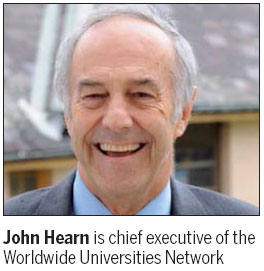Balancing best of East and West
Updated: 2013-04-05 07:45
By Sudeshna Sarkar (China Daily)
|
||||||||
University network chief says more teachers are needed
John Hearn, a British-Australian, was born in the western Indian city of Ahmedabad in 1943, and grew up in the subcontinent. He first went to Australia in 1969 to do his PhD, after which he worked in India, China, Thailand, Brazil and elsewhere.
"It was in 1997, when I was working with the World Health Organization in Geneva that I wanted to go home to work with the Australian National University and University of Sydney," the 69-year-old says from Sydney.
When he returned, Hearn found Australia had changed a lot: "It was a lot more international. Culturally, that was very good and attractive. There were many people from different cultures and life had become more international.
"Australia is also competitive. It is a slow growing economy but efficient. The research and innovation system is very competitive. Australians are also very good at entrepreneurship and innovation."

Hearn, a senior scientific adviser to the Australian government in higher education, science and international partnerships, became chief executive of the Worldwide Universities Network (WUN) in 2009.
WUN is a partnership of 19 universities from 10 countries that works in research, education and mobility for greater international engagement and internationalization. Its thrust areas are climate change and food security, public health in non-communicable diseases, reform of higher education and research, and understanding cultures.
The physiology professor talks of the cultural difference in the West and East.
"While teaching in Australia, I found the students strong in questioning. They would question and challenge the professor. When I gave lectures in Chinese universities, nowhere did the students ask provocative questions."
Hearn believes that a lack of respect for family, and for elders in particular, has become prevalent in modern western society. "It's amusing that on the one hand we are critical of Chinese students for showing deference to their elders, while on the other hand, this is something we need to encourage in our own culture."
About eight years ago, an Indian vice-president told Hearn that Indians are born with mathematics and business skills, which is evidenced from the fact that India provides so many chief executives and experts around the world in information technology and business. But the vast majority of Indians do not get an opportunity to develop their skills.
"India needs 1,000 more universities just to meet the demand in the next 10 years. It is an enormous challenge to meet. So is the demand for quality education," he says.
"Look at China, which has similar problems with the increase in demands and in the number of students. There are not enough teachers, and the quality of teaching is often inadequate, (even) though the top universities in India and China have top ranking reputation."
(China Daily 04/05/2013 page15)

 Li Na on Time cover, makes influential 100 list
Li Na on Time cover, makes influential 100 list
 FBI releases photos of 2 Boston bombings suspects
FBI releases photos of 2 Boston bombings suspects
 World's wackiest hairstyles
World's wackiest hairstyles
 Sandstorms strike Northwest China
Sandstorms strike Northwest China
 Never-seen photos of Madonna on display
Never-seen photos of Madonna on display
 H7N9 outbreak linked to waterfowl migration
H7N9 outbreak linked to waterfowl migration
 Dozens feared dead in Texas plant blast
Dozens feared dead in Texas plant blast
 Venezuelan court rules out manual votes counting
Venezuelan court rules out manual votes counting
Most Viewed
Editor's Picks

|

|

|

|

|

|
Today's Top News
Boston bombing suspect reported cornered on boat
7.0-magnitude quake hits Sichuan
Cross-talk artist helps to spread the word
'Green' awareness levels drop in Beijing
Palace Museum spruces up
First couple on Time's list of most influential
H7N9 flu transmission studied
Trading channels 'need to broaden'
US Weekly

|

|







